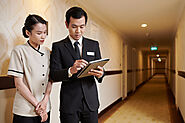-
About
- About Listly
- Community & Support
- Howto
- Chrome Extension
- Bookmarklet
- WordPress Plugin
- Listly Premium
- Privacy
- Terms
- DMCA Copyright
- © 2010-2025 Boomy Labs

 Kiki
Kiki
Listly by Kiki
Let’s be real: learning Business Chinese for hospitality [www.elitelinguistic.com/courses/business-chinese/] is not about memorizing phrases from some random YouTube video that still thinks “你好吗” is what actual humans say. (Hint: they don’t. At least not like that.) If you’re working in a five-star hotel, luxury resort, private club, or even a high-end restaurant that regularly hosts Mandarin-speaking guests, you already know that language is part of the service.

Translation: “Would you like me to call a car for you?”
This phrase is elegant, respectful, and uses 您 (the polite "you"). Way better than something robotic like “你要车吗?” which sounds like you’re offering a ride in the back of a pickup truck.
Translation: “Welcome back, Mr. Wang.”
Get personal and professional. Mandarin-speaking guests notice when you use their surname correctly. Bonus points for remembering preferences or past stays—like a Mandarin-speaking regular who always requests a high floor or hot tea.
Seriously, unless you’re writing a textbook or living in 1997, this sounds weird and overly formal. Chinese guests don’t greet this way in hotels. Ever.
Say instead:
✅ 您今天过得怎么样?
Translation: “How has your day been?”
Warm, casual, and appropriate. It hits that sweet spot of hospitality + genuine.

Translation: “Would you like housekeeping service?”
This is a super useful one during turndown hours. It’s also a great phrase to have ready if you’re working in housekeeping or the front desk and need to politely offer service without assuming anything.
Translation: “If you need any assistance, please don’t hesitate to let me know.”
A total gem. It’s non-intrusive, ultra-polite, and shows service awareness. A must-have in your Business Chinese for hospitality toolkit.
This one is a bit of a red flag. It translates to “What do you want?” and even if you mean well, it sounds aggressive. Not luxury. Not even three stars.
Try this instead:
✅ 请问您想点些什么?
Translation: “May I ask what you’d like to order?”
Softer, kinder, and way more in line with high-end service language.
Translation: “Here is your pu’er tea. Please enjoy.”
Using the name of the item (e.g., 普洱茶 for pu’er tea) shows attention to detail. You’re not just slinging drinks—you’re creating a personalized experience.
Translation: “May I help you with your luggage?”
An essential line for bell staff or anyone near the lobby. Simple, but elegant—and far more polished than just pointing at someone’s suitcase and awkwardly nodding.

Translation: “We’ve prepared the suite for you. We hope you’ll enjoy it.”
This works beautifully when checking in high-tier guests. If you’re in guest relations or front desk, this is one of those “wow” moments you want to get right. Mandarin-speaking guests will appreciate the warmth and consideration.
Translation: “Wishing you a wonderful evening tonight.”
Said with a smile, this one adds a layer of human warmth that keeps guests coming back—not just for the infinity pool, but for how your team makes them feel.
